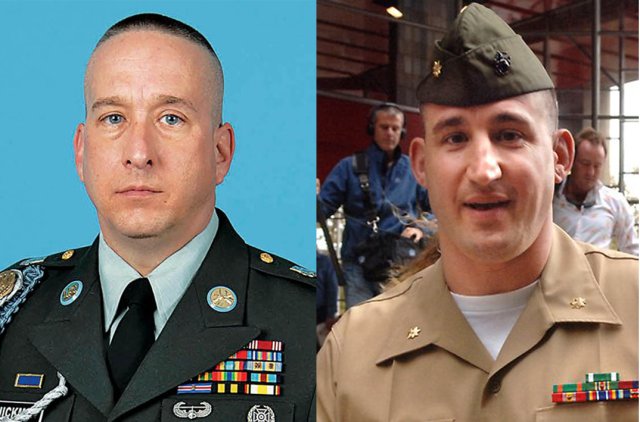
In The Company Of Cowards: Bush, Howard & Injustice at Guantanamo
Michael Mori
Viking, 2014
292 pages, $29.99 (pb)
Murder At Camp Delta: A Staff Sergeant’s Pursuit Of The Truth About Guantanamo Bay
Joseph Hickman
Simon & Schuster, 2015
245 pages, $29.99 (pb)
Major Michael Mori was a Republican-leaning, US military lawyer who “embraced the values I had been taught in scouts, sports, high school, college, law school and the Marines” — above all the ideal of fair play.
Mori was assigned as defence counsel for David Hicks in 2003. Hicks was an Australian citizen captured by warlords during the US-led invasion of Afghanistan following the Al Qaeda terrorist attack in New York in 2001. He was detained in the US Navy base in Guantanamo Bay, Cuba.
Mori, however, was confused about what, if any, crimes Hicks was alleged to have committed. So too were the prosecutors, as Hicks’ imprisonment without charge, but with severe abuse, dragged on for years.
Hicks faced certain future conviction by a rigged Military Commission judicial process that junked all the basic rules of evidence. Mori saw his priority as getting a suicidal Hicks out of Guantanamo.
Faced with the dead-end of the kangaroo court, Mori had to take Hicks’ legal and human rights to the court of public opinion, “the only arena that mattered to politicians”, especially to Australian Prime Minister, John Howard, in an election year (2007).
Howard had done nothing for Hicks for six years when it was in his political interest to promote war and terror neurosis, but with the electoral calculus changed to parliamentary survival, Howard, in a “belated political move to defuse the Hicks issue”, instigated a plea bargain with Washington which at last got Hicks returned to Australia with a residual prison term.
The price Hicks was to pay for an end to his existence of fear, pain and despair, however, was the tag of “convicted terrorist”. This was despite Hicks’ guilty plea being coerced under extreme duress and, this year, ruled void in the US courts.
Mori, who retired from the military in 2012 and joined the social justice section of an Australian law firm, played a vital role in justice for Hicks. But he reminds the readers of his valuable book that “it was they, the Australian public, who got David Hicks out. I hope that the people of Australia never forget that.”
Like Mori, Sergeant Joe Hickman was “a patriotic American” and he was proud to finally get to “meet the enemy” as a guard in Guantanamo in 2006.
“Keeping terrorists locked up was an important job,” Hickman writes. But, like Mori, he also had standards, namely a belief in “basic American principles of decency”, even towards those he had been told were “evil men bent on destroying our country”.
Decency, however, was decidedly lacking in the “excessively punishing” detention conditions, cultural insults and “Rodney King-style beatings” of cuffed and shackled detainees.
The “mass violation of regulations” was disturbing to Hickman, a former civilian prison officer, more so because the abuse by the guards was condoned or orchestrated by senior officers. A culture of lies and cover-up made Hickman “feel shame, both in myself and in my military”.
What tipped him over the moral edge, however, was the murder of three detainees he witnessed. Ludicrously portrayed as a triple suicide designed to damage the reputation of the US in an act of “asymmetrical warfare”, the deaths were, to Hickman, probably the result of “enhanced interrogation techniques” (torture, in other words) that “went too far”.
A US Navy investigation tried to bury the affair in a “dry, heavily redacted, deliberately garbled” report, so Hickman felt compelled to take his story public.
With initial caution, the “lifelong conservative” Hickman approached the Seton Hall University Law School. Its professor — who Hickman feared was a “left-leaning wingnut from the 1960s” — and his students had earlier found that 92% of the almost 800 Guantanamo detainees were not Al Qaeda terrorists at all.
Through forensic document analysis, the official Navy report was shown to be a complete whitewash. Hickman went from wanting to punch the lights out of “typical liberal college kids” to bonding with the “bright, young legal researchers”.
Everybody else, predictably, failed Hickman in his search for the truth about the deaths in custody.
The US military command failed him. The Justice Department and FBI, under new (Obama) management, failed him. The mainstream media failed him.
The cost to Hickman was his career, retirement benefits and lifetime medical coverage as a veteran but he refused to place a price on integrity.
As a Bertholt Brecht poem put it, the military man is very powerful because:
He can fly and he can kill.
But he has one defect:
He can think.
Mori and Hickman thought deeply about the wrongdoing they saw in the “War on Terror”. They courageously acted for truth, justice and an “American Way” that was different from one of lies, torture and killing.
Like the article? Subscribe to Green Left now! You can also like us on Facebook and follow us on Twitter.